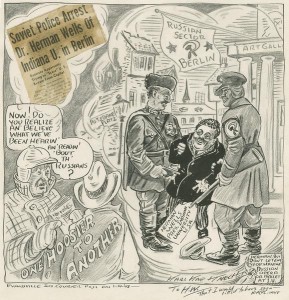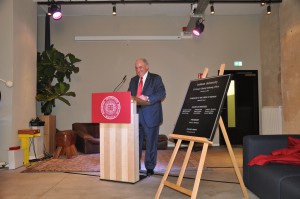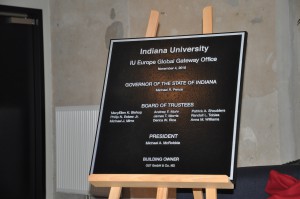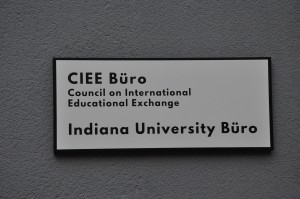History, reinvention and the building of new bridges in Berlin
One couldn’t have bookended any better the IU delegation’s final and hugely historic day of business in Berlin.
The morning began with a 20-minute drive from downtown Berlin to the residential district of Dahlem in the southwestern section of the city, home to Freie Universität Berlin, or Free University of Berlin.
As I’ve briefly touched upon in this blog space, IU and Free University have had a uniquely historic relationship dating back nearly 70 years.
Shortly after the end of World War II, in fall 1947, IU’s legendary 11th president Herman B Wells left Bloomington, Ind., for Berlin at the request of an American military commander charged with helping to rebuild the devastated city, including a system of higher education that had previously been the envy of the world. During his time in Berlin, at the inception of what would soon be known as the Cold War, Wells met with university student demonstrators retaliating against Soviet influence, as well as with professors, politicians, journalists and others sympathetic to their cause. (He himself was famously, albeit briefly, arrested by Soviet police when he sought to look in on a group of German school children. The incident is depicted in a cartoon housed in the IU Archives.)
Wells’ interviews and first-hand assessment of the damaged condition of higher education in Germany led him to champion the establishment of a “free university” in western Berlin, which became a reality a year after Wells had arrived in the capital city. By 1949, Free University had already registered around 5,000 students, including some who came from the Soviet sector of the city and were not yet blocked by the Berlin Wall, which wouldn’t be built for another dozen years.
That’s just part of the remarkable early history of Free University. On June 26, 1963, the same day he delivered his legendary “Ich bin ein Berliner” speech in support of West Germany, John F. Kennedy was named an honorary citizen by Free University and gave another speech on campus in which he addressed the future of Germany and Berlin. Robert Kennedy received an honorary degree from Free University in 1964 and gave a speech dedicated to his brother, who had been assassinated the previous year.
It was around this time that IU and Free University began an exchange of students, which continues to this day and is IU’s longest-running graduate exchange program.
IU’s relationship with Free University deepened its connections to Germany, which date back to the university’s founding nearly 200 years ago. When professor Karl von Jagemann joined the faculty in 1886, German became a major language at IU. Later, he went on to Harvard, where he trained many of the leading scholars in Germanic studies of the early 20th century. Today, the Department of Germanic Studies he helped to establish at IU is one of the leaders in the field and part of IU’s vast collection of educational expertise in the areas of European history, languages, politics and culture.
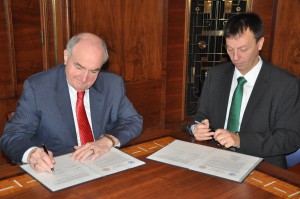
IU President Michael A. McRobbie, left, and Klaus Mühlhahn, vice president for international affairs at Free University Berlin, sign a renewed partnership agreement between their respective universities.
Beyond Berlin, the relationship also served as a taking-off point for IU’s transformation into a truly international university, one engaged in the world through its research and scholarship and its commitment to institution-building in countries all around the globe, such as Kenya, Liberia, Macedonia, Malaysia, South Sudan and Thailand.
This morning’s meetings between IU and Free University provided the leaders of both institutions with an opportunity to reaffirm their historic relationship, as they also explored new possibilities for collaboration, including student and faculty exchanges and the sharing of academic expertise to address what Free officials call “excellence clusters” and IU terms “grand challenges.”
Wells, who died in 2000, a little more than decade after the fall of the Berlin Wall, would be proud of just how closely connected IU and Free University have grown with regard to their core missions of education, research and greater international engagement. The two schools share a number of common academic strengths, including the humanities, the natural, life and social sciences, and area studies. Furthermore, both IU and Free University are among their respective nation’s top research universities, a status supported by IU’s membership in the prestigious Association of American Universities and Free University’s position as one of just nine German universities to win in the German Universities Excellence Initiative, a national competition for universities organized by the German federal government.
Indeed, Free University and IU have a great many successes and shared interests to build upon. To this end, leaders of both institutions concluded their meetings today by signing a renewed partnership between the two institutions, thus ensuring a future of increased cooperation and collaboration, and keeping alive the spirit of Wells.
A gateway to Europe and a great day for IU
After the morning meetings at Free University, members of the IU delegation returned to the heart of Berlin for a meeting with U.S. Ambassador to Germany John Emerson. Just 24 hours earlier, Emerson had participated, along with IU President Michael A. McRobbie, in the grand opening of the new Global Institute of the Council on International Educational Exchange, which both men lauded as a major development in increasing study abroad opportunities for university students of all backgrounds and promoting greater cultural understanding.
This afternoon, in an embassy conference room overlooking the city’s famed Brandenburg Gate and Reichstag building, Emerson also had high praise for IU’s efforts to increase its foothold in Germany and across Europe, and he pledged his firm support for the university’s new gateway facility in Berlin, housed within the CIEE Global Institute.
If the meetings at Free University served as an inspiring reminder of just how far IU has come as a true international institution, tonight’s formal inauguration of the new IU Europe Gateway signaled a future of even greater global engagement across the continent.
The new office, IU’s third such facility following the establishment of offices in Beijing and New Delhi, will serve as a first-ever home base for IU activities here in Europe, supporting scholarly research and teaching, conferences and workshops, study abroad programs, distance learning initiatives, executive and corporate training, alumni events and more.
“The IU Europe Gateway will give IU faculty and students greater access to opportunities in Europe; and at the same time, it will allow our students, alumni and university partners who are based in Germany and elsewhere in Europe to connect directly with IU in one of the most dynamic cities in the world,” McRobbie said at tonight’s event. “It also underscores IU’s belief that it is absolutely essential in this day and age that the education of all of our students includes an international dimension. By encouraging more IU students to study abroad, it will help to create global leaders, and it will support scholarship, research and international collaboration that will help future generations of American and European students succeed in our extensively interconnected world.”
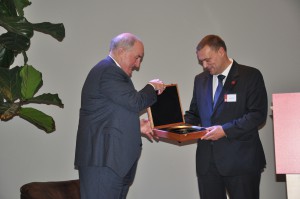
IU alumnus Mark Renner, right receives Distinguished International Service Award from President McRobbie.
About 100 IU alumni and friends excitedly joined in the grand opening celebration. They included Mark Renner, a 1994 IU graduate and Berlin native who came to IU on a German American Exchange Service Scholarship, ultimately earning a master’s degree in journalism. He is president of the Berlin chapter of the IU Alumni Association and was instrumental in helping establish the IU Europe Gateway. For his efforts, Renner was awarded the Distinguished International Service Award by IU Vice President David Zaret.
They also included two alumni of the IU Jacobs School of Music, Berlin-based mezzo-soprano Nadine Weissmann and pianist Andrew Crooks, who treated guests to an inspiring operatic performance following McRobbie’s unveiling of the building’s shiny new plaque.
And they included several current IU students, including a few native Hoosiers, who happily shared stories about what it’s meant to them to have the opportunity to live and learn in one of the most dynamic cultural, historical and political centers of the world. One student described her time in Berlin as “life-changing” and said she looked forward to other students having similar experiences by way of the university’s new gateway office and its many connections around the region.
McRobbie closed his remarks by toasting the new facility and saying, “May all who come here to learn, to teach, to conduct research and to work together do so in the spirit of international cooperation and understanding that the IU Europe Gateway office represents.”
In the coming days, members of the IU delegation will take measure of the new relationships and partnerships that were forged over five busy days in Berlin and the bridges we’ve begun to build here.
For now, however, as we prepare to leave this remarkable and resilient city, one so rich in history and culture, we can take pride in knowing that the legacy of Herman Wells lives on and that the foundation has been firmly established for increased international engagement at IU that will greatly impact the lives of our graduates as they go on to change the world for the better.
Auf wiedersehen, and thank you for reading!
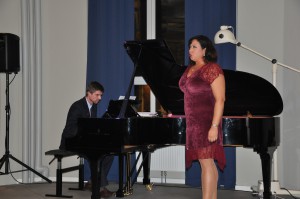
Mezzo-soprano Nadine Weissmann and pianist Andrew Crooks, alumni of the IU Jacobs School of Music, perform at the opening of the IU Europe Gateway.
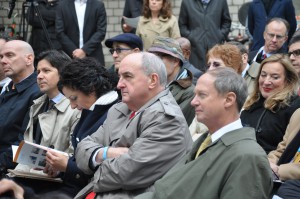
President McRobbie and U.S. Ambassador to Germany John Emerson, far right, at the grand opening of the CIEE Global Institute in Berlin.
Tags: Andrew Crooks, Berlin, CIEE, David Zaret, Free University of Berlin, Freie Universität Berlin, German Universities Excellence Initiative, Germanic Studies, Germany, Global Institute, Grand Challenges, Herman B Wells, IU Alumni Association, IU Europe Gateway, IU Global Gateway Network, Jacobs School of Music, John Emerson, John F. Kennedy, Mark Renner, Michael A. McRobbie, Michael McRobbie, Nadine Weissman, Robert Kennedy, U.S. Ambassador to Germany



